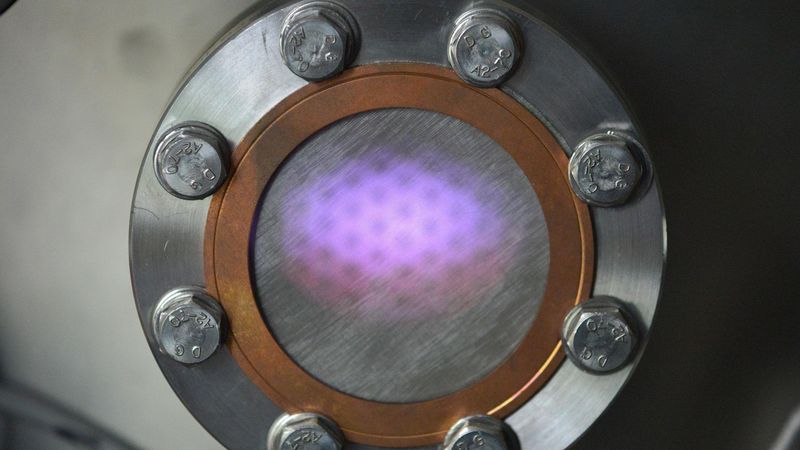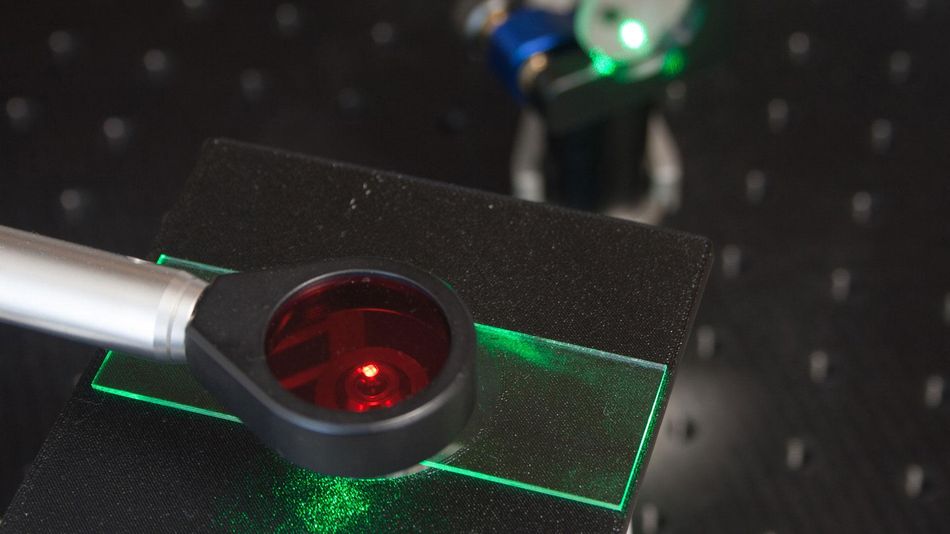Start-ups grow diamond qubits
Qubits are the processing units of quantum computers. They can be created in various different ways. One option is the creation of solid-state spin qubits in materials such as diamonds, in which qubits get stuck in defects that are specifically inserted into the structure of diamond crystals.

Plasma ball in a growth reactor. Credit: © CO / Diatope GmbH
Qubits are the processing units of quantum computers. They can be created in various different ways. One option is the creation of solid-state spin qubits in materials such as diamonds, in which qubits get stuck in defects that are specifically inserted into the structure of diamond crystals. The German Aerospace Center (Deutsches Zentrum für Luft- und Raumfahrt; DLR) has now awarded two contracts related to this activity as part of the DLR Quantum Computing Initiative (QCI). Over the next three and a half years, Advanced Quantum from Allmersbach (Baden-Württemberg) will develop quality assurance procedures to accompany the creation of the modified diamond structures and other solid bodies that are suitable for qubits. Diatope from Ummendorf (Baden-Württemberg) produces high-quality diamond layers with nitrogen-vacancy (NV) centres. The contracts amount to a total of 13 million euros.
"Start-ups benefit particularly from the DLR Quantum Computing Initiative; the young companies are effectively integrated into the development of a commercial ecosystem for quantum computing. This can lead to an industrial base that is internationally competitive and strengthens Germany as a technological location in this key technology," says Anna Christmann, Commissioner of the German Federal Ministry for Economic Affairs and Climate Action (BMWK) for the Digital Economy and Start-ups.
“Nitrogen-vacancy centres in diamond are considered particularly suitable spin qubits for use in the construction of quantum computers,” says Robert Axmann, Head of the DLR Quantum Computing Initiative. “To continue to make technological progress in this field, it is vital to have these spin qubits available in high quality and sufficient number. That is what these contracts aim to achieve.” One of the advantages of diamond-based qubits is that they operate at room temperature. Superconducting systems, which are also solids, are comparatively well developed, but they require extremely low operating temperatures. “For quantum computing, it is still unclear which systems scale well – in other words, allow for higher numbers of qubits – and eliminate or make it possible to correct errors. That makes it all the more important to investigate multiple qubit technologies,” adds Axmann.

Manufacturers reap mutual benefits
The two start-ups support and accelerate the further development of quantum computers based on nitrogen-vacancy (NV) centres in diamond. They also ensure that the manufactured qubits have consistent properties. The awarded contracts will specifically develop and expand the ecosystem for the field of quantum computers based on solid-state spins and are closely interlinked with the contracts awarded for the construction of quantum computers based on NV centres.
Advanced Quantum is working on quality assurance procedures for solid-state spin qubits. The defects in diamonds and other materials will be controlled with laser beams, microwaves and radio frequencies. In order to represent the properties of the spin qubits in as much detail as possible, Advanced Quantum also carries out an analysis of the samples at cryogenic (ultra-low) temperatures.
Diatope produces quantum hardware based on NV centres. Diatope grows ultra-pure diamond layers in a controlled process and then implants nitrogen ions into the crystal structure. The diamonds are then heated. As a result, they regain their lattice structure, which was disrupted by the incorporation of the nitrogen ion. Diatope builds special systems to carry out these individual processes and then works to optimise their operation.
“These contracts have been awarded with close collaboration in mind, not just between the two projects, but also with other industry partners and DLR institutes involved in the DLR Quantum Computing Initiative. Everyone involved will benefit, and we will see advancements in the quantum computing ecosystem in Germany as a whole,” says Karla Loida, Project Lead for the DLR Quantum Computing Initiative. Both start-ups will use laboratories at the DLR Innovation Centre in Ulm. The Ulm site and the DLR Innovation Centre in Hamburg offer synergies with local DLR institutes and other projects involved in the DLR Quantum Computing Initiative.
The DLR Quantum Computing Initiative
The DLR Quantum Computing Initiative is overseeing the development of prototype quantum computers with different architectures over a period of four years. The associated technologies and applications are also being developed. DLR is bringing together established companies, start-ups and other research institutions in order to facilitate the development of significant technological advances.
DLR has been granted funding by the Federal Ministry for Economic Affairs and Climate Action (BMWK), enabling it to award large-scale contracts to companies. DLR is contributing its own skills and research activities to the development and is focusing on technology transfer to industry.
Rapid computations with quantum bits
Quantum computers are an important technology for the future. They can perform calculations and simulations in specific fields of application much faster than conventional supercomputers. Their use is possible, for example, in the transport and energy sectors, but also in fundamental research or even in satellite operations. Quantum computers work on the basis of quantum physics. Their quantum bits (qubits) can not only assume the states 0 and 1, but also intermediate values, distinguishing then from conventional computers and allowing them to be so powerful. At DLR, several institutes are already working with quantum technologies. There is also a great need at DLR to conduct research on and with quantum computers in the future.